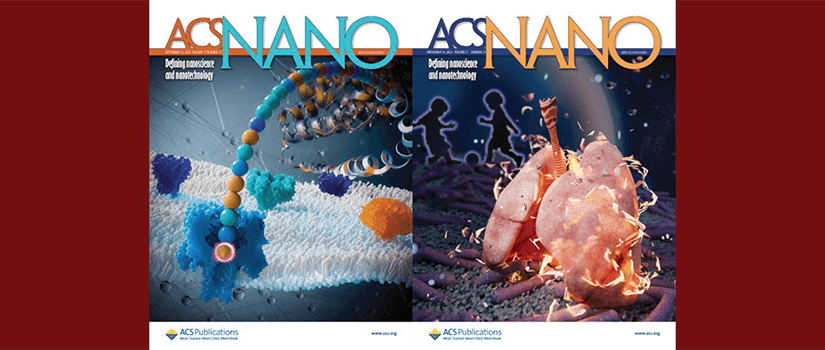Chemical and Biomedical Engineering Associate Professor Chang Liu and his research group recently published two cover articles in the high impact journal, ACS Nano.
The first paper, “Engineering Biological Nanopore Approaches toward Protein Sequencing,” includes co-authors Mark Uline, chemical engineering associate professor and biomedical engineering program director, and Carolina Distinguished Professor Qian Wang from the Department of Chemistry and Biochemistry.
The article summarizes recent advances in biological nanopore sensors in protein sequencing. This includes identifying individual amino acids to the controlled translocation of peptides and proteins. The nanopore systems are emerging as prominent tools for identifying, detecting and analyzing proteins. The publication aims to offer recommendations to advance nanopore-based protein sequencing from an engineering perspective, highlighting the need for interdisciplinary collaborative efforts. Some of these efforts include protein engineering and machine learning-assisted identification to implement in real-world scenarios.
“Since the successful commercialization of nanopore sequencer for DNA and RNA, enthusiasm is surrounding protein sequencing, which will hopefully lead to a simple and cost-effective sequencer to replace, or at least complement the million-dollar sophisticated mass spectrometry instruments currently used,” Liu says. “As we study and summarize recent achievements for our own research in this direction, we wanted to present this review to scientists who are interested in this field and call for future joint efforts to advance this technology.”
The second published paper is titled “Quantitation of Circulation Mycobacterium tuberculosis Antigens by Nanopore Biosensing in Children Evaluated for Pulmonary Tuberculosis in South Africa.” The article explains how the process of converting antigens (toxins) to DNA probes work synergistically with nanopore sensors to better detect active tuberculosis (TB) disease. The low-volume sample requirements make it well suited for accurately detecting pediatric TB. This goal is to prevent misdiagnosis, which can result in undertreatment, irreversible injury or death.
”We are excited to work with our colleagues at Stellenbosch University in South Africa to demonstrate the improvement enabled by this sensor system on pediatric TB detection. We see clear molecular evidence of TB disease in children missed by all other clinical tests,” Liu says. “Now, we are developing an automatic device to pair with the test for point-of-care TB testing and will work with the CDC in the near future to evaluate its diagnostic performance in Africa.”
Liu leads the Biosensing and Biomarker Research Laboratory at the College of Engineering and Computing. His research focuses include point-of-care testing and lab testing assays and devices for protein biomarkers of various diseases, and toxin and pollutant identification, detection, and interaction.
